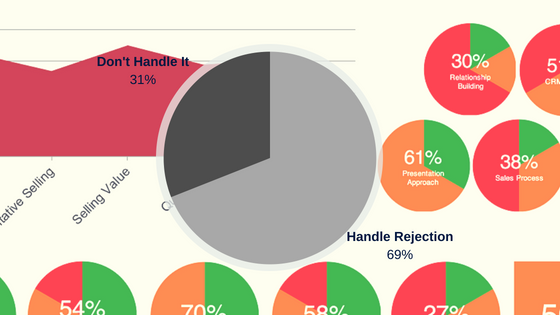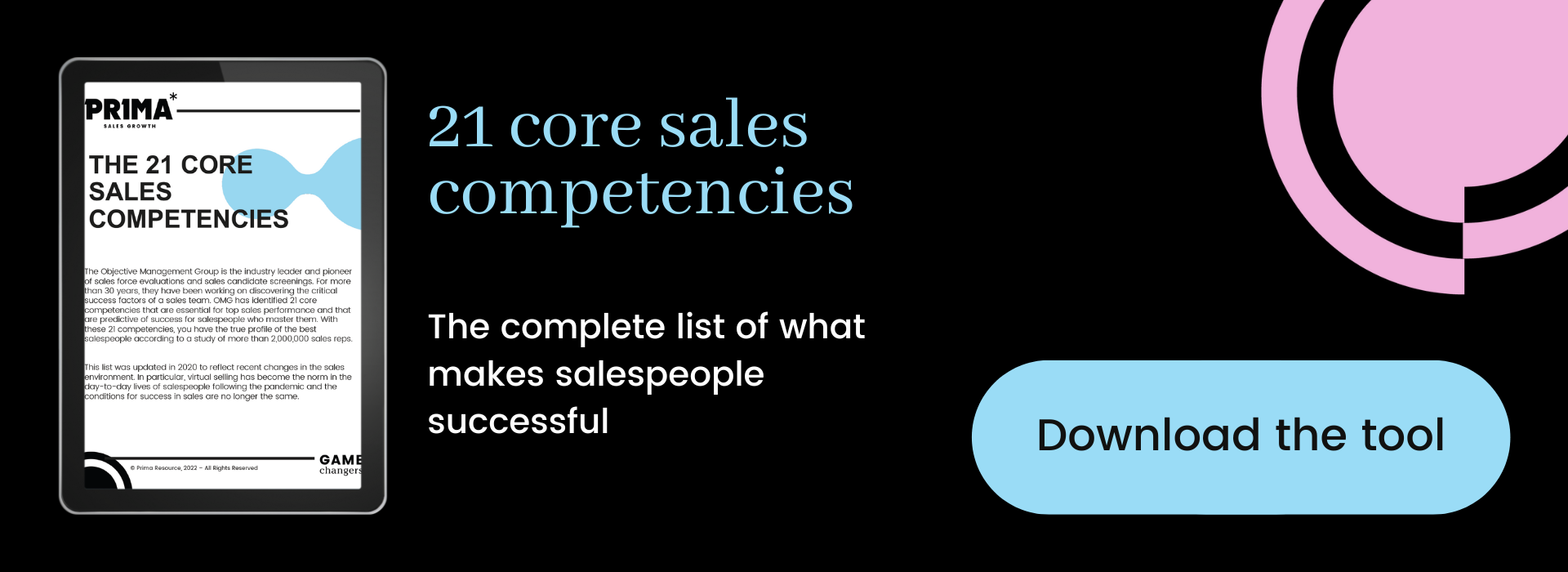
Rejection is an inevitable part of sales. Every salesperson will get confronted with it at some point in time. Before looking at how to handle rejection in sales, let’s look at how to evaluate a sales rep’s ability to manage it as well as the different types of rejection and their impact.
How to Evaluate a Rep’s Ability to Handle Rejection
A sales force evaluation should look at the way rejection is handled after the fact. Most evaluation tools evaluate how a salesperson manages anxiety, before having faced actual rejection. Instead of evaluating how effectively a salesperson can avoid rejection, we want to determine how well a person can recover and move past the sting of rejection.
A Second, an Hour, a Week, or a Month?
Like a cloud hanging over their heads, a salesperson can carry this rejection throughout all the other sales calls they make, for days, weeks or however long it takes to recover. Rejection is a big part of calls reluctance, not wanting to make other attempts to avoid further rejection.
The time it takes for a salesperson to get their head back straight is the amount of time it will take for that person to get back to prospecting and doing their job.
Different Types of Rejection and Their Different Impact
It’s important to note that there are two different types of rejection and their impact differs as well,
The way a prospect chooses to reject a salesperson will affect how different people will handle it.
- Active rejection: pretty straightforward, for example, a salesperson will make a phone call, and the prospect hangs up on them.
- Passive rejection: this would be when a prospect doesn’t respond to an email they received. A few of years ago, this type of rejection wasn’t a reality. Recently with the onslaught of different social and technology platforms, the forums on where a salesperson can face rejection have increased radically.
Interestingly, salespeople that have a harder time recovering from passive rejection will quickly recover from active rejection, and vice versa, so it’s mutually exclusive in this sense.
Another thing to consider about rejection is how far along the sales process did the rejection take place? When the rejections happens is important because it has a direct correlation to how emotionally invested the salesperson has become in the opportunity. READ: Rejection: Does Selling Cause More Anxiety Than Dating?
How Do Sales Managers Help Their Salespeople Recover Quickly from Rejection?
It’s the role of a sales manager to help a salesperson recover from rejection. Here are a few ways they can do that…
Establishing a Recovery Process
A sales manager will encourage their salespeople to develop a mental recovery processWhen they confront rejection, they’ll then be able to leverage their recovery process. This will reassure the salesperson, knowing there are concrete steps they can run through to move along their mental and emotional recovery.
Identity vs. Role
Understanding that identity is different from a role. Identity is who a person is, and role is what a person does. Therefore, when a salesperson gets rejected, it’s a rejection of their role, not in their identity.
Simply put, don’t take it personally…
Journaling and Reading
Writing down your experiences and challenges are effective methods to unload and regroup, any therapist will agree.
Reading or researching recovery techniques, such as A Hundred Days of Rejection, by Jia Jiang 100 days of rejection therapy is a great tool available to salespeople. Jiang, an entrepreneur, blogger, TED speaker and author, invites us to join him in his journey of rejection therapy.
Jiang is a man who, being rejection adverse, took on the challenge of overcoming the impact of rejection by putting himself in a position where he would daily, for a 100 days, face situations that led to rejection.
“My journey has revealed that the stings and slights of rejection are universal among us as humans, but that with conscious intent we can turn rejection into enterprise, insult into ambition, and regret into courage.” Jiang
Takeaway
A good salesperson is rejection proof and recovers immediately from rejection. While it remains a hurdle to overcome, of the other sales DNA findings, rejection has the lowest passing threshold. The passing grade for rejection in the 21 core competencies evaluation is only 50%, so quite a few salespeople succeed in recovering from rejection. In fact, 69% of salespeople can handle rejection:

Source: Statistiques de vente OMG
The trick is, salespeople must emotionally remove themselves from the hurt of rejection, seek adversaries head on, and in this way, become rejection-proof.






